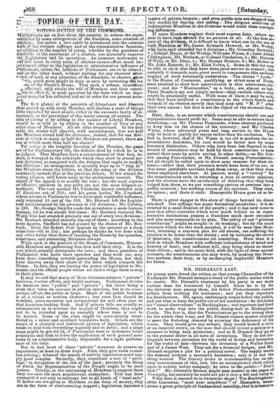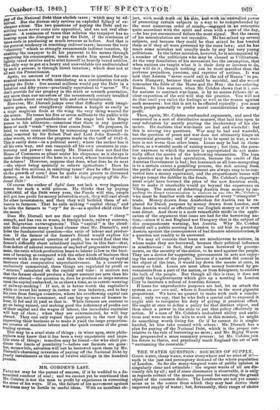MR. DISRAELI'S LAST. .
As young poets dread the. critics, so that young. Chancellor of the Exchequer Mr. Disraeli betrays a dread of the public notice which he courts.. - Mr. Disraeli's treatment by his party is not more curious than his treatment by himself. Since he is by far the cleverest man among them, his fellow Protectionists cannot refrain from inviting his assistance ; and yet they repudiate his benefactions. He, again, ambitiously comes before the public, and yet tries to keep the publie out of his confidence : he disclaims his " casual observations " at Buckingham ; . and reporters had hard work to make way into the public dining-hall at lledingham Castle. The fact is, that the Protectionists go to the wrong shop for the article they want, and Mr. Disraeli cannot muster courage to meet the flattering demand by avowing the deficiency of his wares. They would give any reward they would bestow a civic .or an imperial crown, on the man that should invent a policy or a measure to bring back protection; and to B. Disraeli they go as to the general dealer in all sorts of inventions. They do not dis- tinguish between invention for the.world of fiction and invention for the world of fact—between. the invention of a Walter Scott and of a James Watt. They-ask for_a financial budget, and Mr. Disraeli supplies a plot for _a, political novel. The supply meets the demand without a moment's hesitation.; only it. is not the thing wanted. The literary dealer in statesmanship has au un- easy consciousness of this, and, like an accomplished child called upon to exhibit before Company,' he cries to'the public—"Don't look!" ...IVIr.iDisraeli's finance might pass muster instate pages of Coningsby, but certainly he could not put it into a billand carry it. What does it amount to in its newest shape ? The Buckingham- shire Capcsieien, "most near,neighbour " of -Hampden, ellen- : ciatea kgreatsprinciple of fundamental megalith that iviehnster to pay off theliational Debt nhawnbolish taxes ; win& Unity be nutted. .But the diet-Om:Only revives an exploded fa)lacy of ex.'. chequer ethics: The two-questions of paying' the Debt and re-' mining taxes never come into apposition, and are not real 'alter-. natives. A remission of 'tanesthat relieves the taxpayer has no bearing.upon 'the disregard- to pay the Debt, if the remission Of taxesends in producing as much revenue as before. And that is the general:tendency in remitting indireettaxes ; because the very elasticity " which so strongly recommends indirect taxation, by enabling the, taxpayer to lit his payment to his means through regulating his consumption,' tends to make him spend freely in lightly' tailed ;articles and to stint himself in heavily taxed articles. The only way to get ate heavy and unavoidabletax undiminished by such a process, is through direct taxation which cities not at all suit the Protectionist,. Again, no .amount of taxes that can dome in question for eco- nomical remission is worth considering as -a contribution towards paying the Debt : five.annual millions would pay the Debt in a hundred and fifty-years—practically equivalent to "never:" We don't provide for our progeny in the sixth or seventh generation, any more than our ancestors of the seventeenth century troubled their heads about our railway bills andother tribulations. Bowever, Mr. Disraeli jumps' over that difficulty with imagi- native grace; and straightway disbnrsea a budget as easily as a stage magician finds at the wing the very thing wanted for the nonce. He tosses his five or seven millions to the public with the unbounded openhandedness of the stage lord who flings purses to his adherents—conscious that there is any quantity more of such " trash" where that comes from." He proposes' in brief, to raise some millions by reimposing" taxes equivalent to those': remitted by Sir Robert Peel and Lord John Russell—in other words, to retrace the progress-made in the tariff of 18424 This is easily done-,-in apolitical novel ; where the author fine it all his own way, and can vanquish all his own' creatures in ton- troversy and power: but surely Mr. 'Disraeli does not find the House of Commons so pliant under his eloquence as it alWayis is under the eloquence of the hero in a novel, whose•heroirie devours the debates? However, suppose that done, what does he do next —the object being specially to relieve agriculture? Does he spend the five millions in remitting taxes ?"does he Offer benzines on the growth: of corn? does he make state grants to distressed farmers, as in Ireland? Not at all : he beg ins paying of the Na-
tional Debt ! .
Of course the author of Sybil does not lack 'a very ingenious reason for' such a wild process. He thinks that by paying 5,000,0001. of the Debt -every year the Funds will rise, people will get less profit for money invested in stock, they will cast about for other-investments, ssiad- then they will -bethink. tbein • of ad- vances to farmers. 'That he calls making " capital' cheap," and he tells the farmers to " cry" for it,--as 'a spoiled child cries for the moon!
Does Mr. Disraeli not see that capital has been " cheap " enough, and has run to waste, in foreinn'bontis,- railway excesses,' and Belgravian extravagancies? This "capital" is the cloud= mist that obscures many a head clearer than Mr. Disra'eli's, and' hides the fundaniental question—the ratio of labour and produe: tier. If the farmer or the farmer's friend would. explore 7iis branch of the general question of profit, he would find that the farmer's difficulty about subsidiary capitailies in this-fact—that, fromdefect of natural resources or negleit of progressive itnprove- ment, the ratio which production bears to labour is low in' the busi- ness alarming as compared with the other business that compete with it for capital; and then the withholding of capital increases that comparative unproductiveness. In a country so exclusively commercial, these things are regulated by profit or "returns," calculated 'tin the capital and time': it matters not that the farmer should produce a-larger amount per acre than his compeer abroad—the question is; does he produce so large returns upon the capital embarked, in as short a time, as in cotton-weaving or railway-making 7 -If not, it is better worth the capitalist's while to invest his money in cotton or iron industry, and to buy his corn from foreign countries, where his overflowing capital can outbuy the native consumer, and can buy up more of human la- bour, ill fed and ill paid as that is. While farmers are content to go on being ruined, and making good the deficiency of profits out of their capital and the wages of labour, the inexorable capitalist will buy of them; when they are exterminated, he will buy abroad. They can only regain their position in the race by so improving their business as to make it yield the large proportion- ate returns. of machine labour and the quick returns of the great trading system. This may be a cruel state of things ; in wiser ages, state philo- sophers may know thatit has been a very unpatriotic and impo- litic state of things: remedies may be.found—for who shall pre- dicate -the limits of possibility ?---;-before our farmers are -gone : but, meanwhile, salvation will not be bestowed upon them' by Mi. Disraeli's. charming invention of paying off the National-Debt by yearly instalments at the rate of twelve shillings in the hundred Pounds..



























 Previous page
Previous page